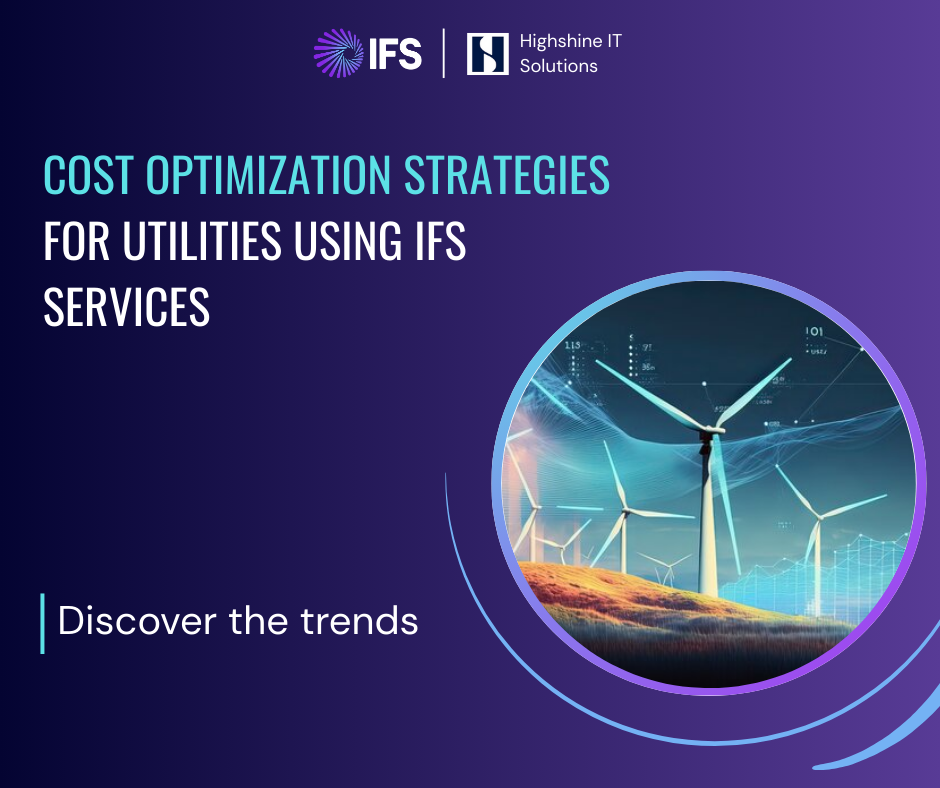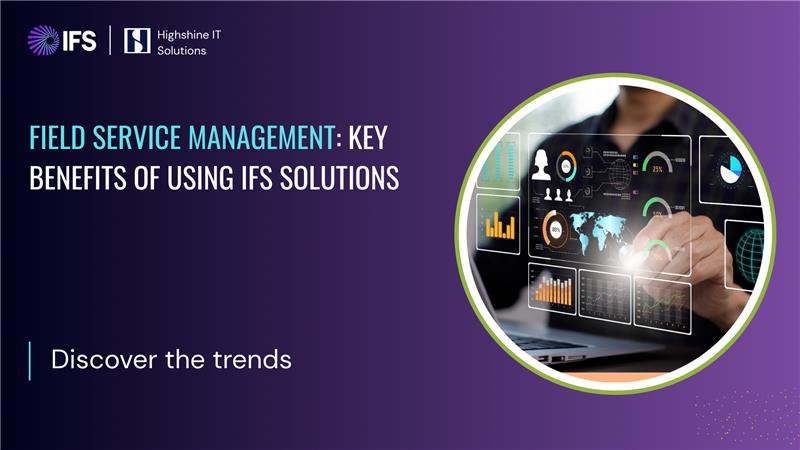
When Systems Don’t Talk, Businesses Struggle - Unlocking the Power of IFS Integrations
Imagine a factory with three systems: customer orders, production schedules, and maintenance logs. Operations must scan spreadsheets, emails, and databases for an urgent order update. The data is there but disconnected.
Systems that don't communicate waste time, provide inaccurate data, and delay decision-making.
Here comes IFS. It links company planning, operations, and delivery. IFS's core modules are formidable, but its actual power derives from its integration with a company's digital environment. IFS connections connect your business by allowing information flow and coordinating activities. It involves your CRM, HR, MES, IoT, and BI tools.
Understanding IFS Integrations
In the IFS world, integration just means making it possible for data to transfer easily between IFS and other systems in a safe, accurate, and real-time way as needed.
IFS has an open, service-oriented architecture that makes it easy for different systems to work together. Some of the most significant components are:
APIs and Services: IFS has REST and SOAP APIs that let outside systems transmit and receive data directly.
1. Middleware and Message Queues: Tools like MuleSoft or Azure Service Bus can manage complicated data flows between several platforms.
2. File-Based Integrations: Systems can automatically share CSV or XML files for simple or bulk processes.
3. OData Interfaces: These let modern reporting and analytics tools connect to structured, queryable data.
Basically, IFS is a versatile "digital hub" that can talk to almost any system your business uses, whether it's in the cloud or on-premises.
Types of Integration Scenarios
Integration varies. Businesses utilize distinct patterns.
Business-to-business (B2B)
Manufacturers can interface IFS with a vendor portal or EDI platform to automate order confirmations, invoices, and delivery updates.
Application-to-application (A2A)
Many firms link IFS with Salesforce, Power BI, and SAP for CRM, analytics, and finance. These linkages eliminate duplicate data entry and give every department a single picture when structured.
M2A/IoT
For maintenance tracking, performance analysis, and predictive alarms, energy, logistics, and aerospace machines and sensors can supply IFS data. IFS automatically arranges maintenance if a connected pump fails.
Cloud/Hybrid Integrations
Increasingly, hybrid enterprises integrate IFS Cloud with on-prem apps. API gateways or middleware synchronize data between environments.
Common Use Cases: Where Integration Delivers the Most Value
Consider some real-world instances of how IFS integrations assist companies:
Unified Customer Visibility for IFS and CRM: Even though IFS does have an in-built CRM, but because of Sales teams f can view live orders and service history in CRM, and operations can get demand estimates in IFS. This streamlines operations and promotes client satisfaction.
1. IFS+BI Tools (Smarter Analytics): Executives can access real-time performance reports using Power BI, Tableau, or Qlik using IFS transactional data.
2. IFS + MES (Real-Time Manufacturing Insight): Production line machines sync with IFS to provide yield reports, production plans, and downtime analysis.
3. IFS + Finance Systems (Unified Reporting): SAP or Oracle financial system connects IFS operational details from all business units without manual reconciliation.
4. IFS + IoT (Predictive Maintenance): IFS transmits automatic service notifications from sensors on critical machines. This reduces aviation and utility unplanned downtime.
Each instance proves that integration makes distinct data useful.
Embedded Generative & Agentic AI
IFS.ai, IFS Cloud's intelligent core, automates and supports all business modules using AI out of the box. This embedded AI allows:
1. Automatic Work Orders & Document Processing: AI reads inspection reports or service requests, prioritises work orders, and updates IFS without operator intervention.
2. Predictive Analytics and Forecasting: IFS.ai accelerates proactive decision-making by predicting risks and opportunities from production planning to maintenance.
3. AI Copilots for Users: Interactive assistance gives planners, purchasers, and service teams real-time recommendations, improving decision-making, from real ERP data, generative AI may summarise insights, produce reports, and write standard vendor or customer messages.
IFS becomes a smarter partner for connecting, understanding, and proactively acting on data.
Workflow Automation with n8n and Other Tools
IFS Cloud works well with modern no-code workflow automation platform n8n. They allow event-driven, multi-application automations like:
1. Supply Chain Alerts: It can instantaneously notify procurement teams via Slack or Microsoft Teams when IFS supply drops below a threshold, reducing restock delays.
2. New IFS orders may update Salesforce, HubSpot, and BI dashboards, synchronising teams without manual exports.
3. Easy Approvals & Factory processes: Automated approval routing, shop-floor IoT alerts into IFS processes, and no human data reconciliation.
Its open-source, user-friendly design lets organizations self-host for privacy or scale in the cloud, providing IT teams unprecedented control and agility.
More Innovations Driving Integration
Companies employ low-code solutions like Novacura Flow to add to and change IFS workflows, and they use AI-powered modules to handle invoices and contracts more intelligently, which cuts down on repetitive operations and improves accuracy.
Integration Tools and Methods in IFS
IFS gives you a full set of tools to make strong integrations:
IFS Connect is an enterprise-level integration framework that works with REST, SOAP, and message queues. RESTful APIs and OData are new, flexible ways to share data in real time.
1. Event Actions and Business Events: Use business scenarios to start tasks for automation.
2. Middleware and iPaaS: Platforms like MuleSoft, Azure Logic Apps, and Dell Boomi connect IFS to complicated settings.
3. Monitoring and Security: Standards-based authentication, encrypted channels, and centralised logging make guarantee that systems are safe and can be audited.
These technologies give teams the freedom to create, protect, and keep integrations that fit their own business needs.
Business Benefits: From Connection to Competitive Advantage
When integrations are done correctly, they don't only link systems; they change how things work. Automatic data flows make things more efficient by cutting down on manual work and mistakes.
1. Real-Time Visibility: Up-to-date, correct information lets you make decisions more quickly and with more information.
2. Faster Response: AI-powered insights and event-driven automation speed up interactions between customers and suppliers.
3. Better Customer Experience: Order tracking that is open and service that is proactive make customers more loyal.
4. Growth that can be scaled: Modular integrations expand with the needs of the organisation, making it easier to adopt new technologies and go digital.
Integrated IFS deployments are frequently the basis for the most innovative and resilient businesses in their fields.
Best Practices and Considerations for IFS Integration Projects
Strategic planning is essential for flawless integration:
Make sure your integration strategy matches your business goals: Don't merely make connections; think about the results.
1. Put first Governance of Data: Set rules for who owns something, how to check it, and how to use it.
2.Wherever you can, use APIs: Standardised interfaces that work in real time are better at scaling than file exchanges.
3. Pay attention to security by using modern authentication, encryption, and role-based access controls.
4. Check on a regular basis: Fix problems before they happen to keep data moving smoothly.
5. Think about the whole cost of ownership: Find a balance between the work that has to be done up front and the costs of maintenance and growth over time.
Following these steps will assist make sure that your integrations are useful business tools instead of weak patches.
Conclusion: The Future is Connected and Intelligent
There is no longer a system that is separate, and no business can afford to have segregated data or workflows.
IFS connectors let you run smart, linked operations with built-in AI and clever workflow automation. This is where digital transformation happens rapidly, explicitly, and with the goal of improving business.
Business executives, consultants, and IT architects may look forward to a more flexible, smart, and prosperous future by integrating with IFS.
Look at your system landscape, look for ways to integrate IFS, and use the new insights in your ERP to get an edge over your competitors. Integration drives AI, automation, and smart growth in the digital economy of tomorrow.
Remember that contemporary integration is more than just connecting pipes. IFS uses AI and automation to make the company smarter, faster, and stronger. You can't make progress without understanding automation.
‘Data that is connected is the foundation; AI and automation build the house you can live in.’





